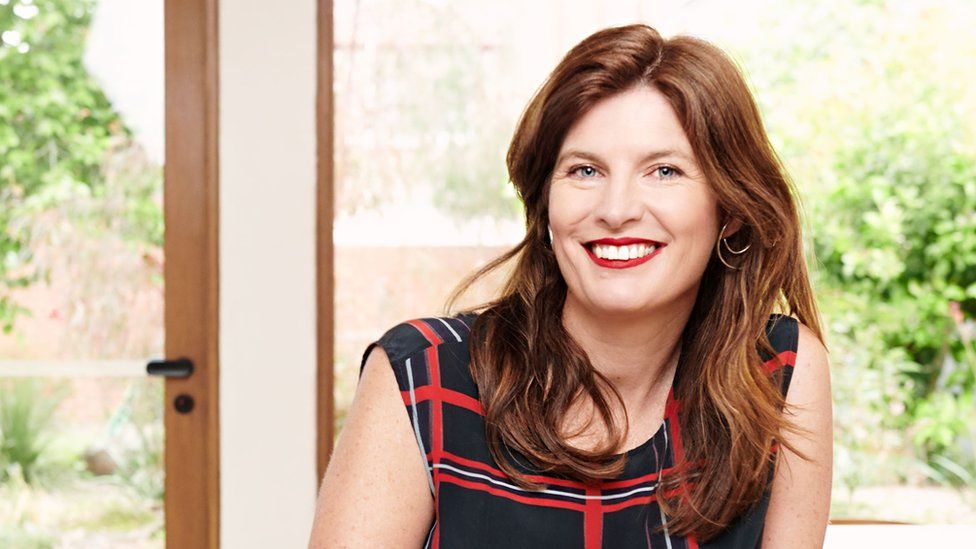'He said it was the stupidest idea he had ever seen'
- Published

The BBC's weekly The Boss series profiles different business leaders from around the world. This week we speak to Abigail Forsyth, founder and managing director of reusable cup business KeepCup.
When Abigail Forsyth first came up with the idea of making and selling reusable coffee cups, one of the first designers she approached to help was utterly dismissive.
"He said to me that it was the stupidest idea he had ever seen," remembers Abigail.
Things didn't improve when she then went to one potential manufacturer. "He said to me 'this is just a cup. There's heaps of things that have been made by people [that are] much cleverer and more useful than what you've done, [and they didn't sell]'."
This was in 2008 in Melbourne, Australia. Abigail and her brother Jamie had come up with the idea for KeepCup because they were increasingly horrified by the billions of single-use coffee cups that end up in landfill every year.
They knew first hand just how bad the situation was, because they had spent the previous 10 years running a small chain of coffee shops. And so they were determined to try to do something about it.
Rather than being upset or deterred by the initial negativity they faced, Abigail says it made them determined to work as hard as possible to make the business a success. "It was a real wake-up call," says the 48-year-old.
Fast forward to today, and KeepCup has now sold more than 10 million cups around the world. The company estimates that this has prevented some eight billion disposable ones going into rubbish bins.
Born in Glasgow, but raised in Melbourne, Abigail initially trained to be a lawyer. After working as solicitor for four years from 1994 she then quit to join the cafe business.
When the siblings started working on initial designs for the first plastic KeepCups, Abigail says that it was Jamie who insisted that it had to be a desirable product, with lots of bright colours.
"Jamie was always saying its got to be sexy, and I was probably more along the lines of it's got to be sustainable," she says.
With the first batch of cups produced by early 2009, they officially launched the product at a design fair in Melbourne. Abigail says the cups were an immediate hit, and they sold 1,000 in the space of six hours.
"At that first design market it was all about the design," she says. "People were saying 'I don't even know what it is, but I want one'.
"It quickly became apparent that people would buy it and want to use it, because they liked the colour, or the design, or what it said about them as a coffee drinker.
"And the behaviour change would just follow because you like using the product - rather than doing something because it's a worthwhile thing to do but it's a bit inconvenient."
With the cups available in different sizes, from 120ml for espressos up to 474ml for large iced coffees or smoothies, KeepCup started selling both to cafes and direct to consumers via its website.
It also sells to corporate clients, which include Australian airline Qantas, and the Bank of England.
Sales have grown steadily over the years, thanks to positive word of mouth, and attending trade shows. The firm's annual revenues are now reported to be more than 8m Australian dollars ($5m; £4m).
Growth has all been organic, with the company not needing any outside investors. In 2014 Abigail bought out her brother, who now runs lunchbox business BeetBox.
To back up its environmental credentials, all KeepCup's manufacturing is completed locally in its two main markets - Australia and the UK. This is to avoid the pollution that would have otherwise been produced from shipping them from China or some other country with lower manufacturing costs.
All its packaging is made from either recycled or Forest Stewardship Certified cardboard and paper. Meanwhile, its main offices in Melbourne and London are both solar powered, and the firm now donates 1% of its revenues to environmental projects after signing up to the global 1% For The Planet scheme.
Paul Klymenko, chief executive of Australian environmental group Planet Ark, says that "for over a decade KeepCup have been pioneers in durable and reusable products which contribute to the creation of a circular economy".
He adds that the company has "created products which people enjoy using time after time, minimising waste and reducing the need for virgin resources such as trees".
More The Boss features:
Back at KeepCup, Abigail says the business has been "severely affected" by the continuing Covid-19 pandemic. While most coffee shops in its main markets remain closed, others are refusing to accept reusable cups.
"Reuse can, and does, continue," she says. "For added precaution some cafes are now dosing from one cup to another or washing reusables prior to filling.
"[And] many of our customers have been in touch asking us to continue to advocate against single-use, highlighting that single-use does not equal sterile."
She adds that KeepCup users should always keep their cups clean and dry when not in use.
Looking behind coronavirus, Abigail says she wants KeepCup to be seen as the business "that kick-started the demise of the disposable cup".
She adds: "People have always said 'how can you have a business with just one product, a cup?'. But I think it's like the gateway drug, it opens the conversation around sustainability and waste, and frees people up to take it further in their own lives, however they choose."